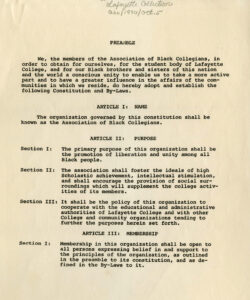Diversity, Equity, Inclusion Updates
The country and the Lafayette community are at a moment in history that draws comparisons to decades ago. In the country’s faltering efforts to deal with racism, a great deal of time has been devoted to responding to symptoms rather than root causes. This explains why history continues to repeat itself. There is nothing new about the protests against systemic racism that are happening across the country. There will never be an acceptable explanation to what happened to Michael Brown, Tamir Rice, Philando Castile, Breonna Taylor, George Floyd, and countless others throughout history.
This moment, however, feels different. Black Americans have been demonstrating and raising consciousness about police and other violence against their community for as long as we can all remember. Now, a large number of white Americans have lent numbers and support to the protests filling the streets across the country, expressing concerns over racial disparities in policing—leading to a broader examination of racial disparities in other aspects of America.
Colleges and universities serve as a representation of society, and Lafayette—with its long history as part of the Easton community—plays an important role. In September 2019, the College announced that the role of senior diversity officer and the initiatives undertaken by the person holding that position would change to a campus-wide approach led by senior administrators who would constitute the Diversity, Equity, and Inclusion (DEI) Council. This council would be responsible for generating campus-wide initiatives and collaborative programming, as well as bringing together appropriate committees to help build a more inclusive campus community.
Black history is both complex and engrained at Lafayette. Eleven Black students attended the College from 1832 to 1846, but it would then be another century until they were again allowed to apply in the 1940s. One of the first civil rights demonstrations to take place on the College campus occurred in 1952, when students protested the restriction of Lafayette’s football team from bringing a Black teammate to play in the Sun Bowl. In 1956, Phi Kappa Tau fraternity members resigned from the national chapter after it refused to accept the pledge of two Black Lafayette students. In the 1960s, the formation of the Association of Black Collegians led to the publishing of “The Black Manifesto,” outlining demands to the College administration for more Black students and faculty, a Black students program, an end to racism on campus, and a cultural center. In 1970, the first Black women were admitted to Lafayette.
Decades later, in December 2016, a collaborative effort among campus organizations generated yet another list of concerns for marginalized students on campus, which included a call for the College to reject racial harassment, protect students of color and LGBTQ students, provide a place of sanctuary for undocumented students, hire a more diverse faculty, and add social inequity courses to the curriculum. The call for change has since been led by those most affected by systemic racism, bringing us back to the current moment in history and the efforts being made by the DEI Council in collaboration with the Office of Intercultural Development (OID).
The DEI Council works to ensure that diversity, equity, and inclusion expressed in various forms remain integral to excellence at Lafayette College. The council reports to the president and is composed of the dean of the faculty, associate vice president for human resources, director and assistant director of the Office of Intercultural Development, and assistant to the president for board and community relations. The council assists in establishing priorities, ensuring open and transparent communication, facilitating connections among standing committees, and monitoring progress toward stated objectives related to efforts aimed at enhancing diversity, equity, and inclusion at the College.
Council objectives include the promotion of diversity, equity, and inclusion on campus, including hiring, retention, climate, discourse, curriculum, and programming, as well as outreach to the campus community and acting as a liaison to groups that promote inclusion.
This year, in the wake of renewed protests and demonstrations calling for racial equality, the DEI Council and OID committee sent a letter to the campus community condemning racial violence and calling on all community members to actively fight racism and work to support racial justice.
The council has organized a number of programs, initiatives, and outreach designed to create tangible, lasting change at the College. Some initiatives include community town hall meetings against racial violence and community discussions that took place throughout the spring and summer (planned to continue throughout the year); compiling a list of educational resources on anti-racism and anti-Blackness; meetings with public safety to discuss ways to build a safe campus; a partnership with Communications to redesign diversity content on the Lafayette website; and partnering with HR on evaluating and selecting an anti-racism and anti-bias online training program. The DEI Council also will work with College divisions to create DEI plans this year.

King Warrior, self-portrait by Bryan Fox ’10 aka King Warrior from the Expressions of Solidarity Against Racial Injustice: A Lafayette College Digital Collection.
In collaboration with the libraries’ Digital Scholarship Services, the committee also invites the Lafayette community to contribute to Expressions of Solidarity Against Racial Injustice: A Lafayette College Digital Collection. The collection is an initiative to share creative writing, photos, video, audio materials, oral histories, personal essays, visual art, and published works emerging from the emphasis on Black Lives Matter as an aspect of the multifaceted calls and initiatives toward an anti-racist society.
The DEI Council invites members of the campus community to reach out to council members to share ideas on enhancing DEI at the College, get the council to engage with an ongoing initiative or a campus group’s work, or accept an open invitation to attend any or all of the DEI Council’s biweekly meetings by emailing the council at deicouncil@lafayette.edu.ate tangible, lasting change at the College. Some initiatives include community town hall meetings against racial violence and community discussions that took place throughout the spring and summer (planned to continue throughout the year); compiling a list of educational resources on anti-racism and anti-Blackness; meetings with public safety to discuss ways to build a safe campus; a partnership with Communications to redesign diversity content on the Lafayette website; and partnering with HR on evaluating and selecting an anti-racism and anti-bias online training program. The DEI Council also will work with College divisions to create DEI plans this year.
In collaboration with the libraries’ Digital Scholarship Services, the committee also invites the Lafayette community to contribute to Expressions of Solidarity Against Racial Injustice: A Lafayette College Digital Collection. The collection is an initiative to share creative writing, photos, video, audio materials, oral histories, personal essays, visual art, and published works emerging from the emphasis on Black Lives Matter as an aspect of the multifaceted calls and initiatives toward an anti-racist society.
The DEI Council invites members of the campus community to reach out to council members to share ideas on enhancing DEI at the Ccollege, get the council to engage with an ongoing initiative or a campus group’s work, or accept an open invitation to attend any or all of the DEI Council’s biweekly meetings by emailing the council at deicouncil@lafayette.edu.
